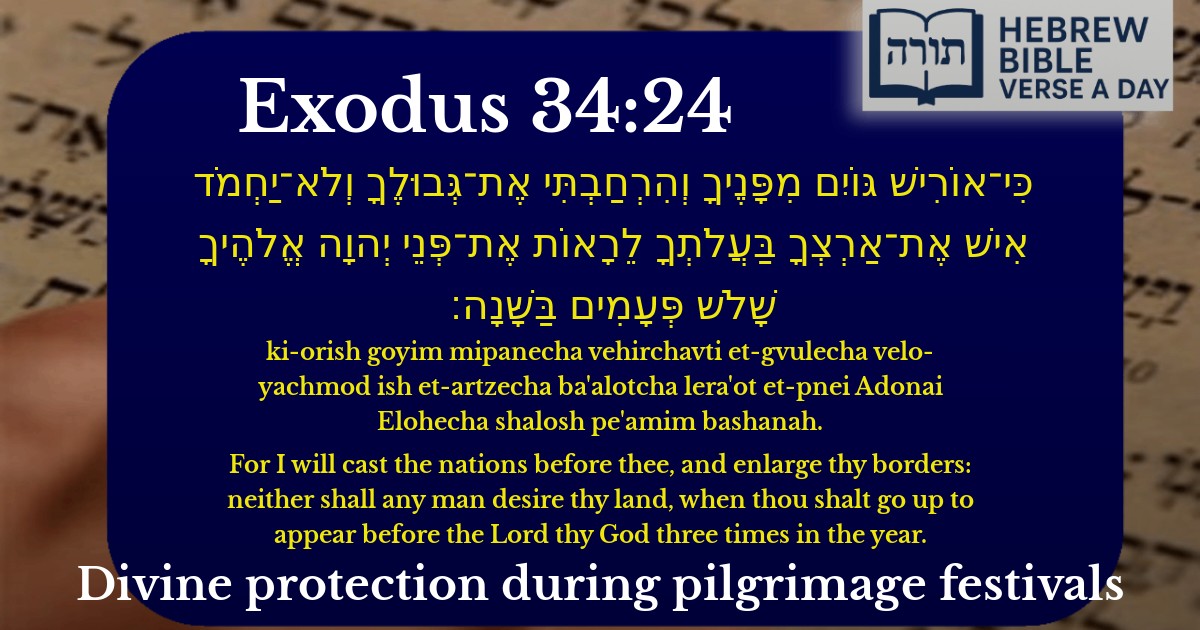Frequently Asked Questions
Q: What does Exodus 34:24 mean when it says 'I will cast the nations before thee'?
A: This verse means that Hashem promises to help the Jewish people conquer the land of Israel by driving out the nations living there. Rashi explains that this refers to the seven Canaanite nations, whose land was promised to the Jewish people. This was part of the covenant between Hashem and Israel.
Q: Why does the verse mention going up to appear before Hashem three times a year?
A: This refers to the three pilgrimage festivals (Pesach, Shavuot, and Sukkot) when all Jewish men were commanded to go to the Holy Temple in Jerusalem. The Talmud (Chagigah 2a) discusses these obligations. The verse assures that even when the men left their homes unguarded for these pilgrimages, Hashem would protect their land from invaders.
Q: What is the significance of the promise that 'no man shall desire thy land'?
A: This shows Hashem's special protection over the land of Israel when the Jewish people fulfill their mitzvot. The Midrash (Mechilta) explains that even when the men left for the pilgrimages, their enemies would not take advantage to conquer the land, demonstrating that the land belongs eternally to the Jewish people when they follow Torah.
Q: How does Exodus 34:24 apply to Jews today?
A: While we don't have the Temple today, this verse teaches us about Hashem's protection when we prioritize serving Him. The Rambam (Hilchot Chagigah) derives from this that when we focus on spiritual growth, especially during the festivals, Hashem provides for our physical needs and security in special ways.
Q: What does 'enlarge thy borders' mean in this verse?
A: Rashi explains this refers to expanding the boundaries of the land of Israel beyond the initial borders. The Talmud (Sotah 8b) connects this to the conquests of King David, showing that when the Jewish people are worthy, Hashem grants them success in settling and expanding the holy land according to His promise.


Context in the Torah
The verse (Shemot 34:24) appears in the context of the renewal of the covenant after the sin of the Golden Calf. Hashem promises the Jewish people security in their land when they fulfill the mitzvah of the Shalosh Regalim (Three Pilgrimage Festivals).
Promise of Protection During Pilgrimage
Rashi explains that this verse provides a divine assurance that when the Jewish people ascend to the Beis Hamikdash for Pesach, Shavuos and Sukkos, their homes and lands will remain secure. Even though the land would appear vulnerable with its inhabitants gone, Hashem promises that no enemy will covet or conquer it during these times.
Expansion of Borders
The Ramban notes that "I will enlarge your borders" refers to the fulfillment of the promise to Avraham that his descendants would inherit from the Nile to the Euphrates (Bereishis 15:18). The Sforno adds that this expansion will come through Hashem's intervention, not through military conquest.
Three Annual Pilgrimages
Divine Protection Mechanism
The Kli Yakar offers a profound insight: the very act of fulfilling the mitzvah of aliyah l'regel (pilgrimage) creates a spiritual protection over the land. When the Jewish people demonstrate their devotion to Hashem by leaving their homes to worship, Hashem in turn protects what they've left behind.
Contemporary Application
While we currently lack the Beis Hamikdash, the Chofetz Chaim teaches that this verse reminds us of the principle that when we prioritize our spiritual obligations, Hashem provides for our physical security and needs.